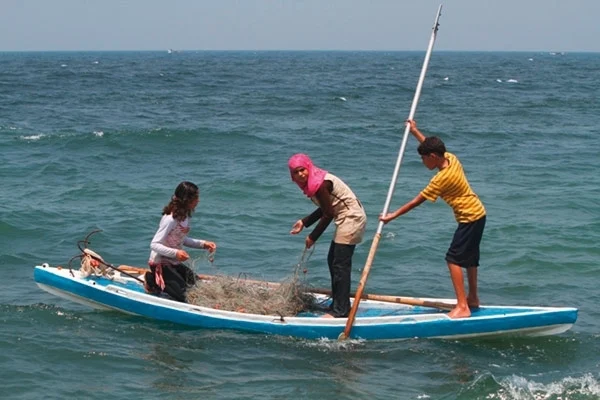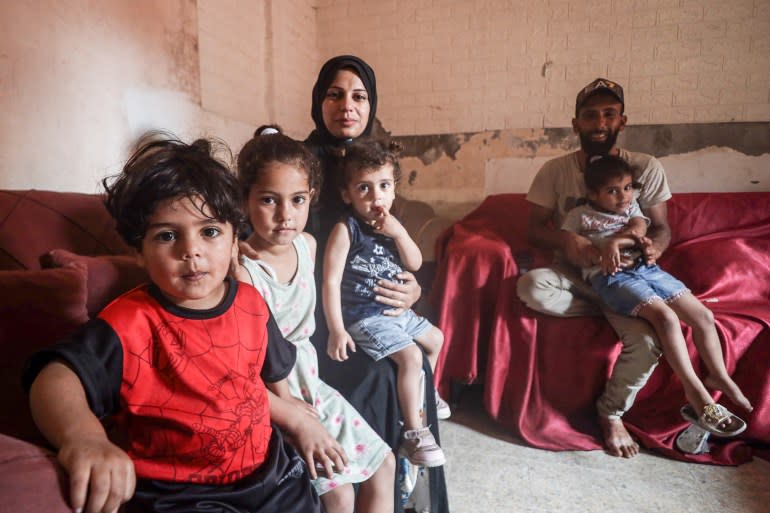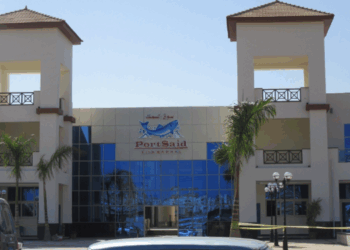Gaza’s First Fisherwoman (Madleen Kallab) Inspires Bold Humanitarian Voyage Amid Growing Blockade Crisis – Off the coast of Sicily, a small sailboat catches the wind—not just in its sails, but in its spirit. On its wooden deck is more than humanitarian cargo. There is a name painted boldly on the side: Madleen. That name carries a story, a struggle, and a statement.
The random choice by international activists of the name “Madeleine” to call the humanitarian aid ship of the “Freedom Flotilla” heading to the Gaza Strip to try to break the siege was not a humanitarian gesture towards the Gaza Strip, which has been suffering from the details of the war for more than twenty months, but it was a living tribute to the Palestinian fisherwoman Madeleine Kallab, who, like all Gazans, lost everything during the ongoing Israeli aggression since October 7, 2023.
This vessel, launched in early June 2025, is part of a civilian maritime mission to Gaza, a region blockaded, bombarded, and brutalized for over 18 years. The ship represents the unrelenting will to live with dignity, even when the world turns away.
Her story with the sea began at the age of five when I was accompanying my father, and I worked in fishing after her father fell ill when she was thirteen, and like any Palestinian fisherman in Gaza, her life and daily pattern were confined between the sea and the house, and the interest in knowing the speed and strength of waves and winds to know the times of the presence of fish or not, and this is what I used to since childhood in a place where most women are confined to traditional domestic roles, she ventured daily into dangerous waters. For years, Israeli naval forces have maintained strict control over Gaza’s maritime zone, often firing on or detaining fishermen who stray beyond an imposed limit. For Madleen, the sea was not a choice—it was survival.
The physical requirements of the fishing profession pose the biggest challenge for Palestinian dogs, but the lack of equipment and capabilities, and explained that the war caused her to lose everything, like other fishermen, “as the boats were destroyed and the nets were torn, and everything I built with my father and husband and our development of boats and saving money went unheeded during the war.
That singular act of courage, quietly repeated day after day, caught international attention. But more importantly, it caught the hearts of those who saw in her something larger than resistance. They saw hope.
Now, in 2025, a flotilla of international activists, inspired by her story, is attempting to deliver desperately needed aid to Gaza by sea—navigating not just maritime currents, but geopolitics, military threats, and moral neglect.
As of mid-2025, the UN has declared parts of Gaza to be in “full-blown famine.” Children are dying of hunger. Safe drinking water is nearly nonexistent. Medical aid is blocked or delayed at borders. International humanitarian organizations report systematic obstruction.
In this context, the Madleen is more than symbolic—it is urgent.
At a time when feelings of disappointment and betrayal are growing, and the cries of the people of Gaza are rising without a response, the Madeleine ship set sail, an icon of defiance, carrying no weapons, but rather love and loyalty to wounded humanity, loaded with food supplies that the Israeli occupation has been preventing from entering for three months. Therefore, the Madeleine cannot be considered merely a vessel cutting through the waves. Rather, it is a means of launching a cross-border appeal, a cry against the siege and the machine of destruction and death that has made no distinction between infants and the elderly, between paramedics and journalists, and sending a message that Gaza will not be left alone, despite being surrounded by iron and fire.

The Madleen set sail from Catania, Sicily, as part of the Gaza Freedom Flotilla—a grassroots initiative involving international civil society actors who believe that governments have failed to stop atrocities in Gaza. Their cargo includes flour, baby formula, water purification systems, medical kits, and prosthetic limbs for children injured in airstrikes.
They See You as a Scene That Will Fade…
“They see you as a short cinematic scene, soon to be forgotten.
But we see you as a cosmic moment—eternal.”
— Alaa Al-Qutrawi
Aboard the Madeleine, activists of diverse nationalities embarked, embracing values that transcended race and nationality. They united under the banner of “Justice for Gaza,” a movement they continued toward despite the danger and uncertain outcomes who refused silence:
1. Greta Thunberg, Swedish climate activist
2. Rima Hassan, French MP of Palestinian origin
3. Thiago Ávila, Brazilian, 19 years old, a campaigner for Palestine
4. Yasmin Akar, a German of Kurdish roots
5. Shoaib Ordu, Turkish activist who said: “I can’t live while opening my phone daily to see shattered bodies.”
6. Riva Veyard, French activist
7. Baptiste André, French doctor
8. Sergio Torbio, Spanish sailor
9. Mark Van Rijn, Dutch student
10. Omar Fayad, Palestinian journalist at Al Jazeera
11. Younes Mohammedi, a French journalist of Arab heritage
12. Pascal Moreras, French sailor arrested in the 2018 Freedom Flotilla
Their reasons are simple, as is their message:
“We cannot be silent anymore.”
Their mission is clear: deliver humanitarian aid directly to Gaza by sea, and shatter the diplomatic inertia that has enabled genocide to unfold in slow motion.
“Enough is enough,” said Thunberg before departure. “If governments won’t act, we will. We are not weapons; we are witnesses.”
The risks are real. In 2010, a previous Gaza flotilla was raided by Israeli commandos in international waters, resulting in the death of 10 activists on the Turkish ship Mavi Marmara. No legal accountability followed.
In May 2025, another ship in the same flotilla, the Conscience, was struck by a drone while docked in Malta. Activists believe the attack was meant to send a message: stay away.
Still, the Madleen sails.

And along the way, the ship rescued four Sudanese refugees adrift in the Mediterranean—a potent reminder that Gaza is not the only humanitarian crisis at sea, but perhaps the one most consciously ignored.
When asked what she thought of the ship named in her honor, Madleen Kulab—still living in Gaza—said:
“They carry my name. But I carry the name of every woman, every child who hasn’t given up. This is the highest kind of courage: sailing into danger, not to take life, but to give it.”
Her words are not just poetic—they are prophetic. In a world where headlines blur suffering into statistics, Madleen’s voice cuts through: personal, poignant, and profoundly human.
The voyage of the Madleen may not end at a port. It may end in interception, arrest, or worse. But its journey has already succeeded in one vital mission: waking the world up.
Through this mission, Gaza has once again become visible—not as a battlefield, but as a home full of people who dream, suffer, and resist.
If a fisherwoman can cast her net into dangerous waters, and a group of activists can set sail with nothing but a conviction, then what excuse do the rest of us have for staying still?
The sea is vast. But so is silence. And somewhere between them sails a boat named Madleen—an act of courage, compassion, and refusal to give up.
Whether the Madeleine reaches Gaza’s port or is blocked by warships—as so many flotillas before her have been—its mission has already mattered. It reminded the world that action is not always grand but necessary. That silence is complicity, and solidarity can sail even when borders try to drown it.
For Gazans, every name aboard that ship is now carved into their memory like the names of martyrs and streets. Because they came, even when the world forgot.
And for Madeleine Kollab, the woman, the fisher, the mother, and now the namesake of a global cry—her story continues to be cast into the waves, echoing with every tide:We will not be forgotten.
Gaza’s First Fisherwoman (Madleen Kallab) Inspires Bold Humanitarian Voyage Amid Growing Blockade Crisis









